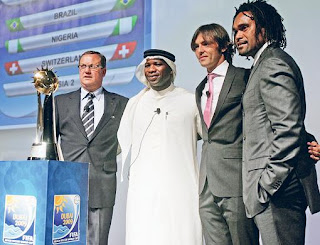Luís Ferreira, an Architect that cooperate with Edigaia Architect Tânia Gama in the development of RAK Edigaia first project, did his Master Thesis based on UAE Urbanism and give it the title "Fresh Water Gulf".
I will post here the abstract of the thesis. Thank you Luís Ferreira for your collaboration in this blog.
"ABSTRACT
Both architectural and urban practices in some Arab countries have been revealing an exponential growing way and also a degree of wonder that no one can disregard. Among all nations in the Arab League, a country emerge from its great achievements, especially in those fields - the United Arab Emirates.
With an oil sustained economy and ruled by a neutrality stance facing all conflicts that happen in its neighborhood, this 7 emirates federation reclaims its independence in 1971 and soon takes the economic growing path, supported by its natural resources wealth (oil and natural gas) and total openness to the rest of the world.
In a timescale of three decades, its territory sees itself dominated by the desire to show the world its wealth and potential, its cities build themselves at a frenetic pace, moved by the ambition of its governors in placing the Emirates on the global scene.
The adoption of the modern language in their cities was believed since its ruling origins as a requirement for its worldwide recognition and so for the external investment catching. Dubai, the most mediatic city, also known as a superlative city, becomes an oasis for the catching of that kind of investment, tax free and providing a familiar lifestyle to the occidental expatriate/tourist, tolerating his vices. Abu-Dhabi, the oil soaked capital, has a more contained development at a first stage, only recently joining Dubai in the mega development and commercial openness phase.
Today, the social and ecologic echoes of an exponential urban growth pace based on the adoption of architectural and urban languages alienated from the social and climatic country’s reality are being felt. Non criticized urban strategies and Guinness Book mega developments captivated world attention, but were also them (and their subjacent strategy) that contributed for the social segregation atmosphere that dominates the entire country’s territory.
Both in the labor or touristic field, the United Arab Emirates economy and development was since its origins supported by the expatriate population sector. Nowadays, the expatriates constitute somewhat 80% of total country’s population. The greater part comes in search for some wealth, staying always for a certain period of time. Likewise, the Emirates acquire a virtual demography condition – expatriate population will leave without looking behind at first sign of trouble.
The climatic context was also neglected, the generic modernism that rules great parts of these cities forces an unmeasured waste of resources – the excessive energetic spend on cooling spaces and the extreme water consumption that some structures require are components that place the Emirates on the top of the list of countries with the biggest ecological footprint, which leads to some alerts and reprehensions by the international community.
Recently, there’s a positive sign on engaging all those issues by the government, shown by planning approaching that includes the city’s whole and their different social layers, by probably more efficient economic diversification strategies and by serious incursions in the use of renewable energies.
Will the United Arab Emirates follow the path leading to its territory and regime sustainability?"
 My friend and partner Mohamed Hassan was in Gaia on 22 and 23 of December to have some meetings with companies with interest in Arab markets.
My friend and partner Mohamed Hassan was in Gaia on 22 and 23 of December to have some meetings with companies with interest in Arab markets.














